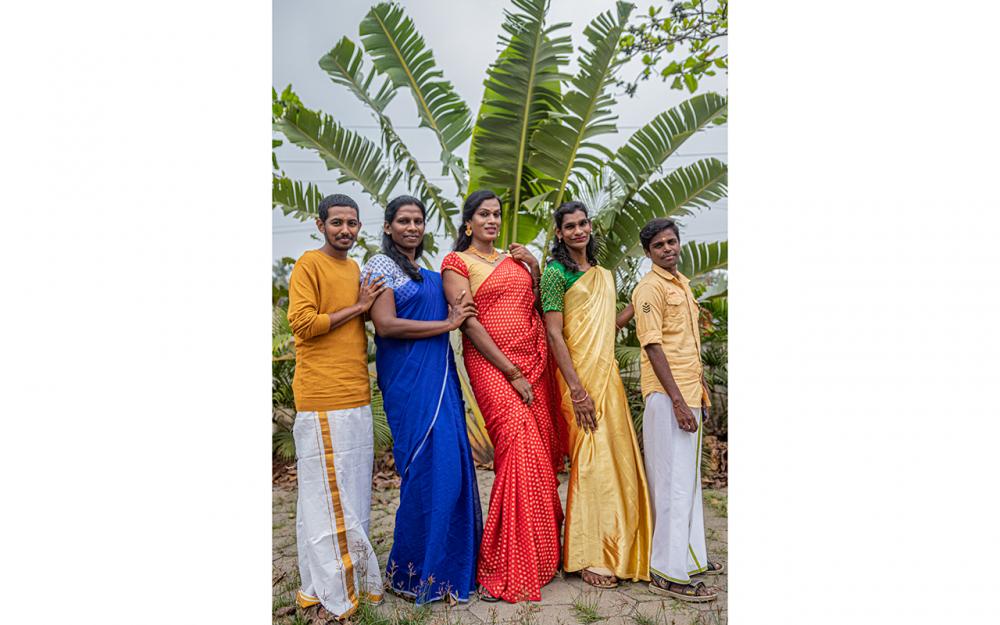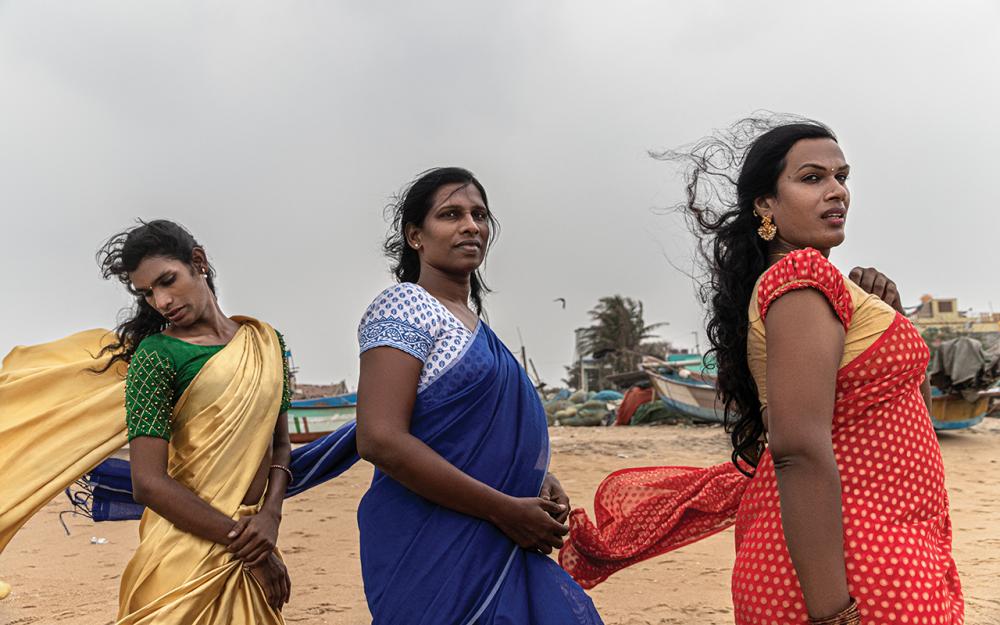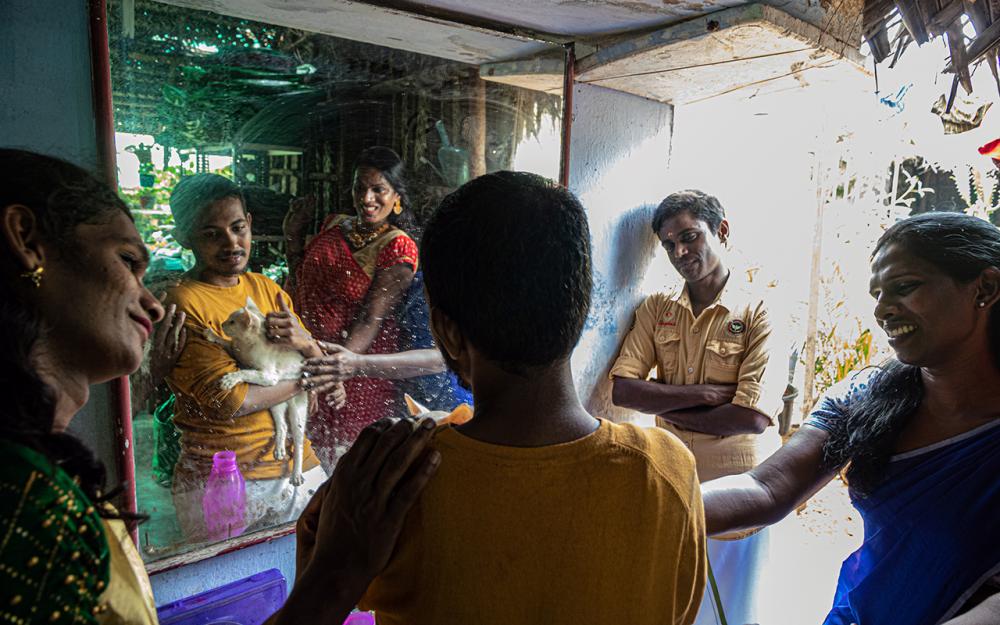By Kamala Thiagarajan
It was, he says, the worst year of his life.
Sanjiv, a transgender man in his mid-20s from a small town in southern India, remembers 2018 as the year he jumped from a moving train to escape being sexually harassed. It was the year he argued bitterly with his parents, who refused to accept his gender identity and dragged him to a psychiatrist who would slip drugs into his coffee and give him mysterious injections by force. It was also the year he shaved his head and moved 350 miles away to Chennai, after a failed suicide attempt, leaving behind Sengottai, the town he grew up in and loved, for a harsh life on the streets. 
Members of the Rotary Club of Madras Elite, India, including (from left) Sanjiv, Nila, Deepthi, Sivapriya, and Saran, are focused on serving the needs of India’s transgender community.
Photo by: Siddharth Behl
Despite having a degree in business administration and having trained as an accountant, he could only find menial jobs because, at first, his parents refused to hand over his graduation certificates, which he needed for interviews. So Sanjiv worked long hours in a restaurant for low pay, washing mountains of dishes. "Just surviving was a daily challenge," he says. (Like others interviewed for this story, Sanjiv goes by first name only.)
But five years later, Sanjiv has made a dramatic turnaround. He went from dishwasher to trained cook. Then he got a job at Wipro, a technology services and consulting company. A friend reached out with an invitation to join Rotary, where he found community and support. Today, he's president-elect of the Rotary Club of Madras Elite.
Chartered in November 2021, the Madras Elite club is the first of its kind in India, made up entirely of transgender members and dedicated to addressing the needs of the transgender community. Among its charter members is Nila, a trans woman and social activist. Nila was trained as a pharmacist and has served as a public relations representative for PeriFerry, an organization that creates job opportunities for the transgender community. She also runs her own service organization called the Pharm Foundation, which advocates for the neglected health care needs of transgender people as well as those experiencing poverty in her community. ("Pharm" stands for People Health Action and Research Management.)
In 2017, N. Dhanraj, a social entrepreneur and at the time a member of the Rotaract Club of Dexterous, invited Nila to his club to give a speech on the challenges that the transgender community faces. "Nila was always a good friend," says Dhanraj (who like many people in South India goes by his first name and an initial for his family name). "Her speech helped members understand more about the lives and struggles of trans men and women, and how we could help promote inclusivity and acceptance in our society." 
The Rotary Club of Madras Elite, India, has three major goals: to improve public awareness of issues concerning transgender people, to help people who’ve had to leave their homes, and to prevent bullying.
Photo by: Siddharth Behl
Later, he asked Nila if she'd like to become a Rotaractor herself and join the Dexterous club. "Rotary has always been inclusive," says Dhanraj, who is now a member of the Rotary Club of Madras Coromandel. "There are many clubs across India who have welcomed transgender members."
While Nila is still a member of Dexterous, she realized that to focus specifically on transgender-related projects and needs, it made sense to charter a new club. The initial hurdle was financial. Facing discrimination, many of the club's members struggled to find and keep jobs. They couldn't afford the Rotary International dues, but other Rotary members, including District 3232 Governor-elect Ravi Raman, stepped in to cover costs during the club's first two years.
Each of the club's 25 charter members has overcome adversity and pain. "We've all seen a lot of problems in our lives," says Deepthi, a trans woman in her late 30s who works in an IT company and is the club president. "Our goals are to now help other transgender people avoid these pitfalls and save them from extreme discrimination." The club has three major goals: to improve public awareness of issues concerning transgender people, to help people who've fought with their loved ones and left their homes, and to prevent bullying.
Recently, they've connected with schoolchildren in online workshops, asking them to support peers who may be exploring their gender identity. "We tell them to be a buddy, not a bully," says Nila. "That kind of sensitization starts at a young age." They're also helping secure national ID cards and documentation for transgender people who may not have access to their identity documents because of family disputes. They would like to use microfinancing programs to help club members set up small businesses and become financially independent. "We wish to be seen as productive members of society," says Deepthi. "People rarely see transgender individuals as being in positions of strength and tend to typecast the entire community as either beggars or sex workers, and that's a problem."
Other initiatives they'd like to take on include a nationwide photography project to showcase portraits of successful members of the trans community whose gender identity may not have been widely known. Another is a documentary about the challenges they face.
Meanwhile, Sanjiv continues to thrive after the cascading challenges he faced in years past. He has reconciled with his family and is hopeful about the power of greater representation to influence change. "Parents of trans children would be far more accepting if we had a chance to make something of ourselves," he says. "We need to give the community a reason to come out and the support to do so. Rotary has given us a platform; it's a chance to unite, to work together, to raise our collective voices against discrimination." 
Photo by: Siddharth Behl
Empowering India's transgender community
The Madras Elite club's priorities include helping transgender individuals:
Complete their education. Bullying in schools leads many transgender students to drop out. Based on 2011 census data, the literacy rate among India's transgender community has been estimated at 56 percent, compared with India's overall rate of 74 percent.
Obtain new identity documents. Without a government ID, transgender individuals cannot open a bank account, vote, or access government assistance and health care.
Make their voices heard. Charter member Nila serves on the Transgender Welfare Board for the southern state of Tamil Nadu, an important platform for promoting the social welfare and economic empowerment of the transgender community.
This story originally appeared in the March 2023 issue of Rotary magazine

